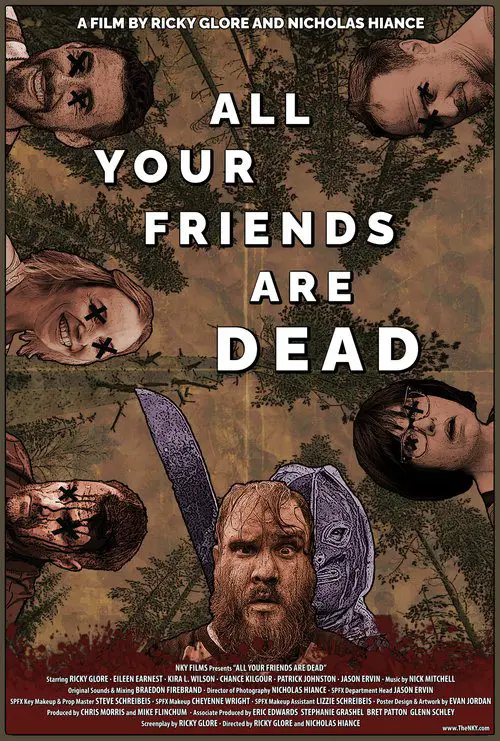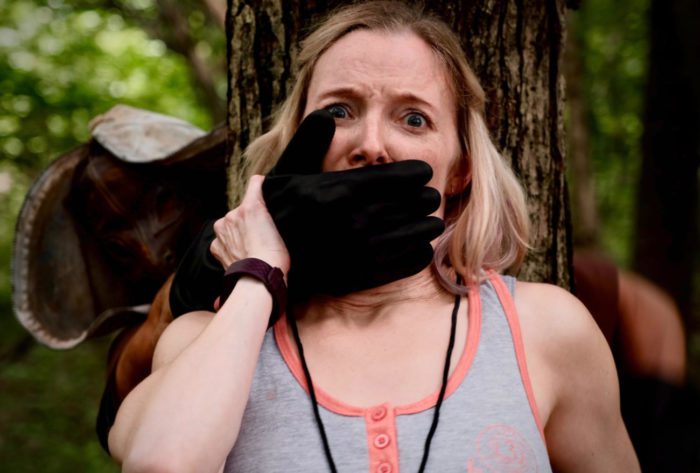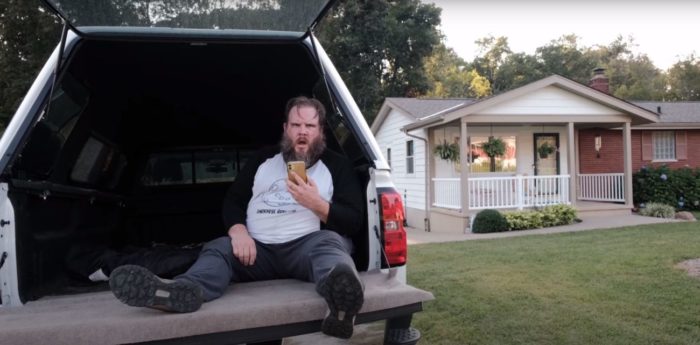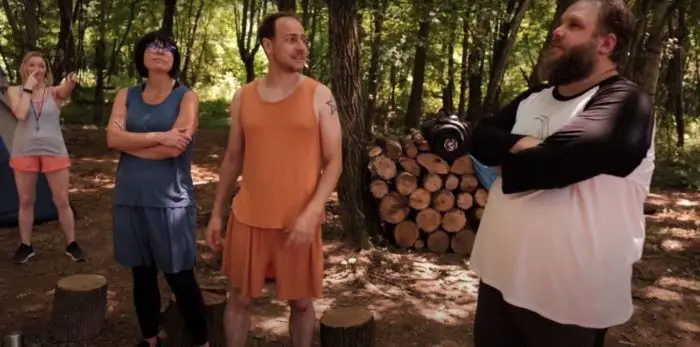Trigger warning: this article contains references to the act of suicide.
If you are having suicidal thoughts or know someone who does, please seek help. You are not alone. Talk to someone you can trust, or call the National Suicide Prevention Lifeline at 1-800-273-8255.
My interest is most piqued when I find new ideas from fascinating places. This is likely why I’ve conducted more interviews with first-time feature directors than anyone else in filmmaking. After seeing Ricky Glore’s All Your Friends Are Dead, I found it resonated in a handful of areas and couldn’t wait to talk with its creator. Glore’s film, about a disaffected man whose glory days are behind him who decides to take his own life, is undoubtedly heavy material. Glore, however, uses the film to tell a comedic story pitted in the honesty of mental projection, depression, and psychology. It isn’t every day you come across a film quite like All Your Friends Are Dead.
You can watch our podcast-sized interview below or read excerpts from our conversation.
Ricky Glore and I sat down in late August to discuss the film, our busy schedules conflicting as we both have multiple commitments to attend to. Glore, a comedian, had not only been busy promoting his movie, attending its theatrical premieres, and trying to get it into more film festivals but was also booking gigs to perform in Florida and Utah while preparing to have his show taped for a new stand-up album during the latter. With someone this busy, it’s impressive he had time to talk at all, and what’s more, I couldn’t have asked for a more humble or down to Earth person to speak with. Glore, who says he “wore many hats” while making the movie (actor, co-director, producer, co-writer, etc.), must be used to the whirlwind pace.
I first asked Glore to tell us a little about his movie. Funded through Kickstarter and made on a microbudget of less than six-thousand dollars. He deferred that to a web outlet’s synopsis, saying:
“My original press release was ‘What if The Breakfast Club became The Big Chill and went camping in a Friday the 13th movie?’ They succinctly made it so you wouldn’t have to know any of those movies and wrote it as ‘what if the teen slasher movie grew up?”
Glore continued by saying he was thankful to whoever synopsized the film better than he did on the initial press release because it allowed for a more detailed description of the film. He also joked about trying to pull up the new synopsis on his computer by saying, “I think it’s ironic I’m talking about succinctly describing the movie, and I’m taking a half an hour.” The atmosphere of our interview stayed upbeat and rarely deviated, though it may have become a bit sobering as we approached the film’s themes.

Reading the synopsis, Ricky Glore apprises, “After making the drastic decision to end his life, Matt Willbe writes an email alerting his strange high-school friends that he will be saying goodbye for good at the camping grounds where they have gathered in the past. Matt’s friends arrive just in time to save his life…but little do they know a deranged masked killer is lurking in the woods, ready to pick them off one-by-one. All Your Friends Are Dead.”
As we headed to dive into the film, I was caught in a faux pas as I attempted to compliment the re-watchability of Ricky Glore’s All Your Friends Are Dead, stating I had seen it three to four times now, and thoughtlessly said, “I was trying to get through it,” one more time before the interview. I got a well-deserved roasting and learned a clear lesson about fumbling with words around a quick-witted comedian.
The Dream Sequence
Identifying my favorite scenes in the movie, all of which aren’t horror related, I first asked Ricky Glore to talk about Matt’s flashback scene. In the film, Matt (Glore) passes out after writing an email to his friends and glimpses his friends’ characters and supposed thoughts before entering a surreal version of his empty high school. The nightmare scene, shot in black and white, is soaked in dread with ideas about the people you once knew in high school and what reaching your potential could mean if it turns you into a killer.

“For me, it’s the people that deal with depression. What they perceive other people’s thoughts of them are, regardless of having a conversation or any bit of insight into their psyche of what a stranger or even someone that you’re once familiar with does think of you. […] My brother is a psychiatrist, so anything that I say that sounds remotely astute as far as a diagnosis is from him and the communications we’ve had as a family. But people that put themselves down, they project, usually, that other people have these thoughts of them that never have existed, have never been uttered, have never been a thought in their heads, and I think Matt Willbe classically goes through that. These are all his own thoughts that he has about himself.
“The bar scene, I think, is the first time that we’re like, ‘Oh, okay, maybe there is a breakdown that is going on that isn’t in the reality that really exists.’ Matt is kind of creating his own reality, and then that’s why the dream sequence happens right after. After that, it’s because he’s starting to have his breaking point, and, for me, the lawn guy scene, in my mind, is the last scene that exists in any sort of reality. Everything else is kind of an unreliable narrator.”
Glore says that while working on the film, he discovered that the process was like a puzzle, and as more people got involved, the puzzle evolved and grew on its own, looking different from what he’d first envisioned, better with the help of his creative crew.

“Nick Hiance (co-director) and I wanted to bring both of our sensibilities together to then make the film. One of the things that we did was we’re like, okay, we need to have dedicated, at least one actor, where we could have that one actor in almost every scene who would that be, and I was like, ‘Well, I guess that’s me.’ And so, that’s why I was in it and wore that hat. But as you’re putting the puzzle together after you’ve filmed the thing, you start seeing what works, and you start constructing in the best way possible, and that may look entirely different from what you originally planned in that first stage. And then when you start getting other entities involved with music, and sound, and the mixing. Braedon Firebrand, who did the mixing and did some additional original score; when you go into the dream sequence, there’s already a little bit of carnival music that happens at the beginning that I think lets the viewer know, okay, this movie is not 100% serious.”
“When it shifts into the dream sequence, without having a conversation, [Firebrand] did something that I’m like, ‘Oh yeah!’ We go from color to black and white, it’s almost reverse Wizard of Oz, but the music itself almost has that [sings Wicked Witch theme from The Wizard of Oz] that like kind of carnival, fair, high-school rah-rah-rah sis-boom-bah feel, that I was just like, ‘oh this is brilliant.” If we were only cognizant of when we were writing it or doing it to lean into The Wizard of Oz aspect of that all his high-school friends represent the Cowardly Lion, that they represent the Scarecrow…Like that would have been so smart. I’m happy to say if anybody picks up on some subtext that they think is there, it’s not. It’s just a happy accident that these different iterations of putting this puzzle together of an independent film and the different creatives that came in, they found different things and highlighted some areas, I think to make them work better than they were originally intended to.”
Harold’s Hardware
The Harold’s Hardware scene is my favorite scene in All Your Friends Are Dead. It’s an exceptionally comic idea coming from the darkest of places. Matt, making a stop on his way to the woods, stops at a hardware store to buy the rope he intends to kill himself with and finds an overly helpful cashier that causes him a world of aggravation. The scene is dry and sardonic, brutally encapsulating modern retail while imbuing it with Kafkaesque impatience to Matt’s want to exit. I asked Ricky Glore where that scene came from and if he had some sort of story that led to the creation of the scene.

“I’ve worked so many different jobs in customer service, whether it be as a waiter numerous times, or as a cash register ringer, or as a baggage person at a grocery store. I don’t like being a regular at places mainly […] for the same reason that I don’t like family reunions. Where you’re seeing family members that you don’t stay in contact with, and the first thing that, like, their icebreaker of conversation is the last thing they remember you both talking about or the last thing they remember seeing about you. And so this is this weird catch-up, where, unlike my high school friends who there are a couple that I’m really good friends with, but there are stretches of time we don’t talk to each other, but when we do see each other, it falls back very easily into the old rigmarole of like we’re just enjoying each other. We’re not having to placate one another with being like, ‘so I know you have kids. Are they smart? Are they dumb? Are they good? Like, are you happy with them?’ It’s just very easy, and it’s naturalistic.”
“That’s why I don’t like being a regular at places. Because, working in the service industry, I know most people like having you know that you know about them and even the service level things of like, ‘Oh, you come into this Speedway to buy this kind of cigarette. I will have that cigarette ready for you to make you think that I care about you. I don’t care about that. I don’t want to have that. I just want like a waiter at a restaurant, I don’t need to create a personal bond with that person; I just need them to do the job and be pleasant. So, the Harold’s Hardware scene Mike Flinchum, who I think is incredibly funny who wore a lot of hats in this movie as well, who plays Bob, that is his actual hydraulic store in Kentucky that we did a very minimal facelift to look like that.”
It’s pretty clear to the audience that the space isn’t for a hardware store. I interject with the scene’s obviousness. “We leaned into the jokes of that he’s like, ‘aisle one, do you want me to show you where that is?’ And it’s like there’s one aisle. Like, there is not any other aisles. It looks sad, like Matt’s life. Like, it looks a little bit like a Waiting for Godot situation. Of, just like, if Matt didn’t leave that hardware store and the rest of the movie took place in that hardware store, I think you kind of buy it because that maybe is now his new purgatory.“

“All that is scripted, not improvised. There is one point where Mike, who plays Bob, turns and goes to get the second rope after that long pause, and you can see his script sticking in his back pocket. That is the long pieces of paper that are in his back pocket. That scene took many takes to do, we cracked up a lot. We did it so many times that if you go to the second Harold’s Hardware, you can see [SPOILER] strangling Bob that I’m mouthing, ‘Oh hey.’ I’m actually going [singing Olé as “oh hey”] because we filmed that initial scene so many times, I heard him say, ‘oh hey, welcome to Harold’s hardware.’ So, then when we filmed that second scene, I improvised that thinking like, ‘well, yeah, the audience has heard it so much it’s Bob’s catchphrase.’ And then when we were editing, we’re like, ‘Oh no, you only hear it once,’ because yeah, we filmed it a lot, but the audience isn’t seeing all those takes. That’s not a catchphrase, we gotta take out the audio here. This doesn’t make any sense.
“But yes, all that stuff is the unaffected customer service person who, if they don’t say their script of like ‘we have this membership thing,’ they’re gonna get fired. They’re gonna lose their job. And like Bob doesn’t want to go through any of this, but he has to.”
Knick-Knack and Knots
When Matt arrives at the woods, there’s a moment where it dawns on him he has no idea how to tie a noose knot. Like anyone faced with a situation they need help with, Matt looks up how to make the know via YouTube. I asked Ricky Glore about the idea behind this scene, the Harold’s Hardware scene, and Greg’s (Patrick M. Johnston) character, who has become a rich entrepreneurial jerk since his high-school days with Matt—wondering if this was an attempt at attaching callous commercial responses to those in search of human empathy.

“A lot of the humor, and then like a lot of the stuff that deals with suicide and depression, we wanted to come at with an earnest approach because we didn’t ever want to make it look or feel like we were mocking depression or suicide, even though, we know, anytime that you infuse humor with anything that is traumatic, there are going to be some people who knee-jerk to it. Who completely, like, shut it off or just like put up a front before because they’re like, ‘oh, you’re mixing comedy and dealing with suicide. I’m out! I don’t want to hear whatever you have to say because I don’t feel like there’s anything humoristic to mine from that.’“
“When I looked to build the props because one of the props once Matt is hanging himself—to be safe for me, the actor, because I was going to be doing it—was a metal rod through a noose, so it looks like it’s standing straight up and it’s going up and wasn’t connected to anything. So, if I were to fall as the actor, I wouldn’t be attached to anything. The whole apparatus that I was wearing just goes with me. It’s just the metal rod, and the rest of the rope was out of frame above that you couldn’t see. But when I typed in Google ‘how do you tie a noose,’ the first thing that came up [was the] suicide prevention hotline, the number that we put at the end of the film, after the credits. And I was like, ‘oh, that’s interesting,’ and I had to look up a YouTube tutorial to figure out how to tie the noose, and that was another instance of Nick Hiance and I, one of the scenes that it’s like, ‘Okay, it’s just you and I.’ We have a lot of these, and that helps fill out the movie because we only have to rely on each other. We don’t need a cast to be part of this. We were filming that in the woods, and I was like, ‘Sh*t, okay, I gotta tie another noose. I don’t remember how to do it. I’ll go to the YouTube video that I looked up.’ And that wasn’t in the script, and Nick’s like, ‘oh, this should be part of this.’ Because we’re not making fun of suicide, this is earnest. This is humanistic. This is how people get things done. Like, even when things come with instruction manuals. I have a three-year-old daughter; anytime that I built anything for her, I have had the instruction booklet, but I’ve also looked at a YouTube tutorial to just see the pieces come together and see someone else—a human touch to it—put it together.
“So, we were like, ‘alright, well, let’s roll camera on me watching the video, and then we’ll overdub,’ which, that’s Nick’s voice doing the Knick-Knack and Knots. For that part, we’re like, we think this is funny because this is honest and this is relatable, but again, there could be people that watch it in as soon as you dip your toe into depression or suicide, and then you add a little taste of humor they’re just like, ‘No, I don’t find that funny. I’m not gonna laugh at this.'”

As someone who has dealt with thoughts of suicide in the past, I agree with Ricky Glore about the relatability of these scenes. While I never said it to him, these scenes make me feel less isolated because it isn’t only me finding humor in the darkness. For me, finding laughter has always helped when those thoughts encroach. I understand that’s my view from my story, and not everyone will resonate with that mentality, and that’s okay too. Stopping to interject again in our interview, I mention to Glore the mentality of horror movie fans who desperately seek out gruesome murder in the films that they watch.
“You have some sense of desensitization. […] It’s weird that you said that. The next script that I’m working on for our next feature, I started examining that because I was like, ‘why is it so easy to write someone getting their throats slashed or brutally murdered?’ […] I have a joke about this on my first album, we’ll be watching a horror movie, and like kids, old people, middle-aged people, would be getting killed left and right but as soon as they show a dog enter a horror movie, my wife is like, ‘NOPE! Don’t wanna see that!’ And it’s just like, ‘That’s interesting. Why?’ When we can completely cut off our disbelief of being like this is a movie, and this is not real, but then when a helpless animal appears, we then all of a sudden care about its demise?”
What’s Next For Ricky Glore?
“I always have something,” Glore says after I ask him point-blank. He details his screenwriting process, sharing helpful techniques for approaching an idea. And as he wraps up his critique of his own film, he considers a checklist of what he won’t do to begin outlining his next project.

“All of the ideas for the possible next feature film that we have, I’m zeroing in on making sure that the tone is consistent from beginning to end. That, if there is some tonal shifts, that they’re happening and then roller-coastering more to the end. Not going like, [makes a hand gesture of a heart rate monitor]. Because I think the beginning of All Your Friends Are Dead and the end of All Your Friends Are Dead definitely feel like the same movie, whereas the middle feels like its own different kind of thing.
“The thing we’re working on right now that is most likely to happen, based on budget and probability of getting it together, is an idea called Roadkill where, succinctly, it is what if Smokey and the Bandit were a horror movie. So, if someone in a ’77 black Trans Am picked up a bride on a broken down back road, where she thought she was escaping one nightmare and finding her knight in shining armor, it actually turned into a different kind of nightmare. Kind of like The Hitcher a little bit, but the role’s reversed where Rutger Hauer is more the person who picks up the bride instead.
“So, one of the projects we were looking to do because I’m very music-centric and I love the soundtrack to All Your Friends Are Dead is to do a musical because that’s what I was doing in Chicago when I met my wife. We were producing these independent, small-budgeted, black box theater musicals, and I started writing a musical about a pool monster, kind of like a Creature from the Black Lagoon, but that appears in, like, a community pool. So, a little bit of Little Shop of Horrors meets Shape of Water. And I was writing that and really, really wanting that to be the next project, and Nick Hiance being like, ‘I’m not into musicals, but this is very different and weird, and maybe just this could get some eyes on it that we might not normally get from just doing a straight-up slasher or suspense thriller.’ And it turns out, yes, a musical would have all those things, but also takes a lot more prep and a lot more people involved to make it happen. So, I don’t think that is what is gonna happen next. Roadkill is the more feasible thing, and we’re going to be. Hopefully, fingers crossed, shooting a trailer/a proof of concept to get the rest of our investments to make the feature in 2023. We’re looking to shoot the trailer in October.”

As Glore had informed me earlier in the interview, “This isn’t going to be a guest that you’ll be squeezing a rock for water from. I will keep on talking.” So during the second half of our interview, we got a little more freeform. Briefly discussing how his priorities changed, from his time at Second City in Chicago to directing his film and performing stand-up. Then, moving into how digital filmmaking is changing the game for independent filmmakers, how comedies are meant to be satirization time capsules and judged accordingly, the wild nature of James Bond movies, and what film series’ sandbox Glore would love to play around in. The video at the top of the page contains all this and more.
Ricky Glore is a filmmaker worthy of keeping an eye on. His movie All Your Friends Are Dead is currently touring the film festival circuit, having played the Horror Movie Freaks Film Festival last week and showing next at the Tuscon Terrorfest. Horror Obsessive will be keeping an eye out for Roadkill in the meantime. A Hitcher film Roadgames style? Count us in.



